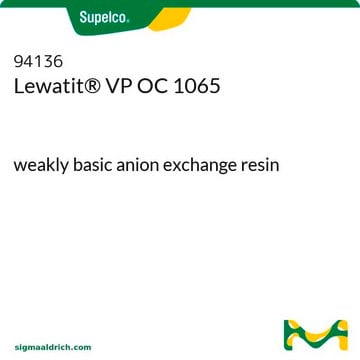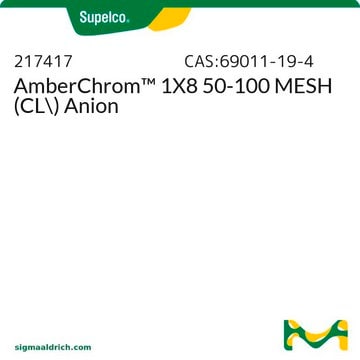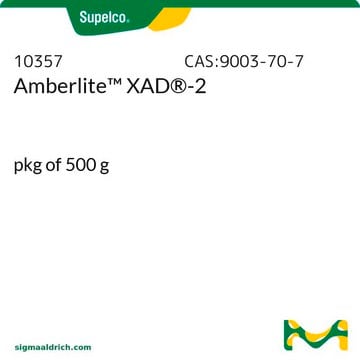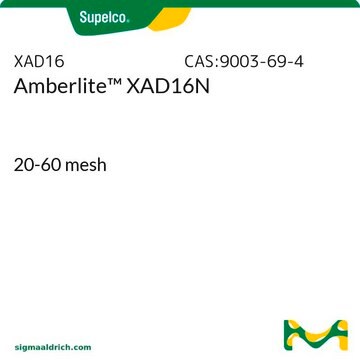62107
Lewatit® MonoPlus TP 214 Ion Exchange Resin
macroporous, 30-35 mesh
Sign Into View Organizational & Contract Pricing
All Photos(1)
About This Item
Recommended Products
product name
Lewatit® MonoPlus TP 214, ion exchange resin, macroporous
Quality Level
form
macroporous
moisture
43-48%
technique(s)
LPLC: suitable
loss
40-60% loss on drying, 110 °C
matrix
styrene-divinylbenzene (macroporous)
matrix active group
thiourea functional group
particle size
400-1250 μm
capacity
1.0 meq/mL by wetted bed volume
separation technique
affinity
General description
Lewatit MonoPlus TP 214 is a type of chelating ion-exchange resin.
Application
Lewatit MonoPlus TP 214 may be used as a mercury-specific adsorber resin for the removal of mercury from contaminated groundwater samples prior to its determination by cold vapor atomic absorption spectrometry (CV-AAS). It may also be used as an ion-exchange resin for the determination of platinum and palladium in particles emitted from automobile exhaust catalysts prior to their analysis using cathodic adsorptive stripping voltammetry (CASV).
Chelating resin especially suited for the removal of metals in hydrometallurgical processes and for the extraction/recycling of mercury and silver.
Legal Information
Lewatit is a registered trademark of Lanxess Deutschland GmbH
Storage Class Code
11 - Combustible Solids
WGK
WGK 3
Flash Point(F)
Not applicable
Flash Point(C)
Not applicable
Personal Protective Equipment
dust mask type N95 (US), Eyeshields, Gloves
Choose from one of the most recent versions:
Already Own This Product?
Find documentation for the products that you have recently purchased in the Document Library.
Claudia G Vasquez et al.
Nature communications, 12(1), 5608-5608 (2021-09-25)
The formation of a hollow lumen in a formerly solid mass of cells is a key developmental process whose dysregulation leads to diseases of the kidney and other organs. Hydrostatic pressure has been proposed to drive lumen expansion, a view
Tim N Koepp et al.
International journal of molecular sciences, 22(17) (2021-09-11)
The renal secretory clearance for organic cations (neurotransmitters, metabolism products and drugs) is mediated by transporters specifically expressed in the basolateral and apical plasma membrane domains of proximal tubule cells. Here, human organic cation transporter 2 (hOCT2) is the main
Mercury removal from contaminated groundwater: Performance and limitations of amalgamation through brass shavings.
Richard JH and Biester H
Water Research, 99(1-2), 272-280 (2016)
Kimberly C Martin et al.
Journal of anatomy, 230(6), 766-774 (2017-04-04)
Branching morphogenesis of epithelia involves division of cells into leader (tip) and follower (stalk) cells. Published work on cell lines in culture has suggested that symmetry-breaking takes place via a secreted autocrine inhibitor of motility, the inhibitor accumulating more in
Hardin Bolte et al.
Journal of virology, 93(4) (2018-11-23)
The genome of influenza A virus is organized into eight ribonucleoproteins, each composed of a distinct RNA segment bound by the viral polymerase and oligomeric viral nucleoprotein. Packaging sequences unique to each RNA segment together with specific nucleoprotein amino acids
Our team of scientists has experience in all areas of research including Life Science, Material Science, Chemical Synthesis, Chromatography, Analytical and many others.
Contact Technical Service








